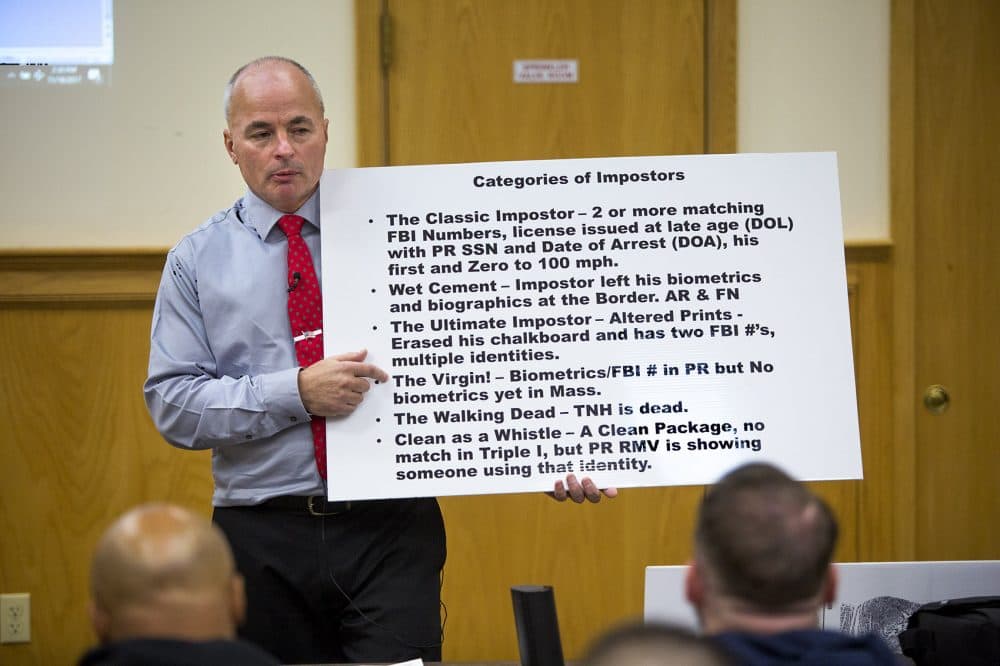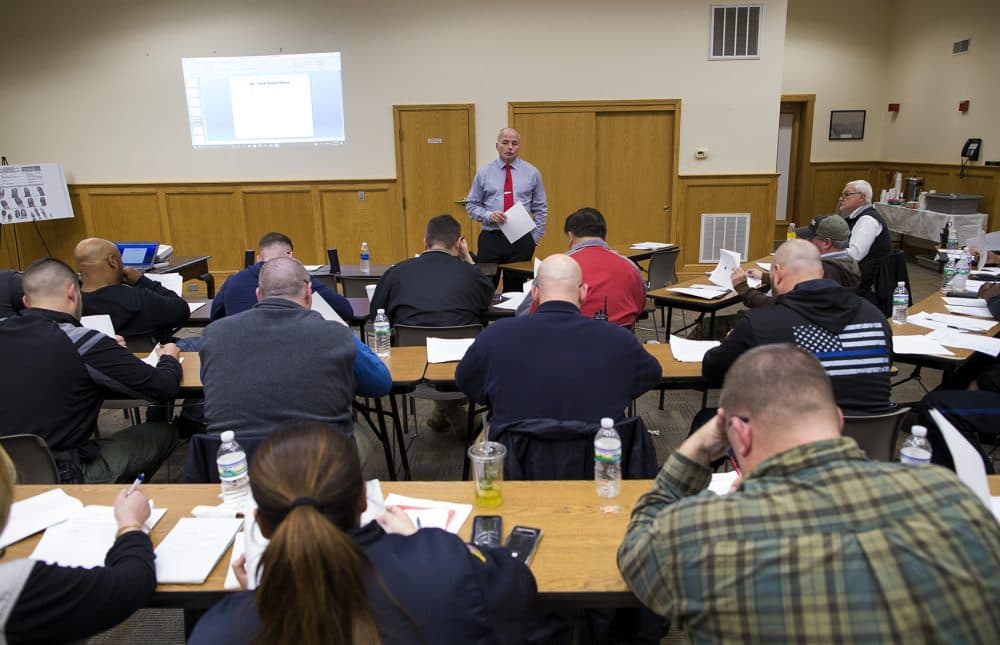Advertisement
'Impostor Training' Aims To Root Out Identity Thieves. But Some See Racial Profiling
Resume
Este reporte tambien está disponible en español.
Detectives, booking officers and county jail sergeants sit side-by-side at the Bristol County Jail and House of Correction, flipping through documents and looking for tips.
They're searching for details that could unmask an impostor.
Saugus police officer James Scott stands at the front of the room, hoisting up poster boards with notes on the different categories of impostors.
"Previous to this class, all of these guys were just looking at a driver's license and accepting it at face value," Scott says. "After you take the class, you realize, let me look at the identity behind the driver's license — 'cause it's a real license, it's issued by the registry — let me look at that identity that's behind it and see how many are people are using it."
Scott, who sports a tightly cropped haircut and a no-nonsense demeanor, has made it his mission to root out identity thieves. He created so-called "impostor training" in 2011, and since then he says he's trained nearly 1,000 law enforcement officials at police departments and houses of correction throughout New England.
The training teaches officers how to go behind the name on the license and get at the actual identity. Using data points like Social Security numbers and dates of birth, officers are trained to cross-reference different databases from the FBI, Immigration and Customs Enforcement and the Board of Probation — steps that an officer may not take during the course of a routine traffic stop.

These are important tools in the search for so-called "impostors." Equally important, Scott says, is knowing who you are looking for — who is the classic impostor. According to Scott, it's a narrow field.
"Probably 99 percent of the time the impostor is a non-U.S. citizen here illegally," he says.
Scott's program defines an "impostor" as a "non-U.S. citizen who has stolen the identity of a real U.S. citizen" to get a valid driver's license. Scott says the majority of the impostors his program identifies are stealing the identities of Puerto Ricans, who are American citizens.
Trainees are taught to pay extra attention to Social Security numbers that may denote a Puerto Rico origin. Scott says his training has caught American citizens stealing identities but, he says, that's very much the exception.
'You're Generating An Answer With The Question'
All of these tactics have some immigration attorneys worried that Scott's training is really just a lesson in how to get away with racial profiling.
Susan Church, the former chair of the New England chapter of the American Immigration Lawyer's Association, was not familiar with the training before WBUR contacted her, but says she is concerned by the premise of the program.
"If you are told to look specifically for Hispanic people or undocumented immigrants to see if those individuals are committing crimes and not looking at the entire U.S. citizen population," she says, "it seems to me you're generating an answer with the question."
Church recognizes identity theft is a serious offense but also says there's plenty of American citizens stealing identities, trying to crack into bank accounts, or boost up their credit score. Church is troubled by the fact that Scott's program doesn't seem to address that side of identity theft.
"It is a program that appears to be generating racial profiling and creating racial profiling at its finest levels," Church says.
As part of his program, Scott says he instructs trainees to submit all individuals to the same scrutiny, though he admits every officer will employ the training in their own way.
'We Know That The Crime Starts At The RMV'
In New Hampshire, state troopers use elements of Scott's program to train clerks at the state's Division of Motor Vehicles.
New Hampshire State Police Detective Sergeant Dave McCormack is on the state's DMV task force. He says since implementing the training in 2015, the DMV clerks have been instrumental in spotting fraudulent documents before a valid license is issued.
"It worked great for us. We went about it aggressively and over the last year and a half we've made 75 arrests, people that have come in with fraudulent documents," McCormack says.

That sort of aggressive training is something Massachusetts state Rep. Shaunna O'Connell, a Republican from Taunton, would like to see more of at the Massachusetts Registry of Motor Vehicles.
"We know that the crime starts at the RMV," she says. "These people are walking into the RMV and committing the felony of identity theft and they're walking out of the RMV with a Massachusetts driver's license."
O'Connell has called on Gov. Charlie Baker to implement a training like Scott's for RMV employees. Brendan Moss, a spokesperson for the governor, says in a statement that Baker has taken steps to ensure unauthorized immigrants cannot obtain a driver's license, and that the RMV works with a special state police unit to deter identity fraud.
But Scott says there's more to be done in the region.
"There really should be a New England-wide meeting, get together, and say 'all right guys, if we get everyone on board, including the registry, we can really make a big difference.' Not only identify the fraud that's currently here, but stop it. I don't need the registry of motor vehicles creating any more impostors," he says.
Scott says he's had trouble keeping up with all of the training requests coming his way and he's working to turn his session into a federal program.
This segment aired on December 21, 2017.
